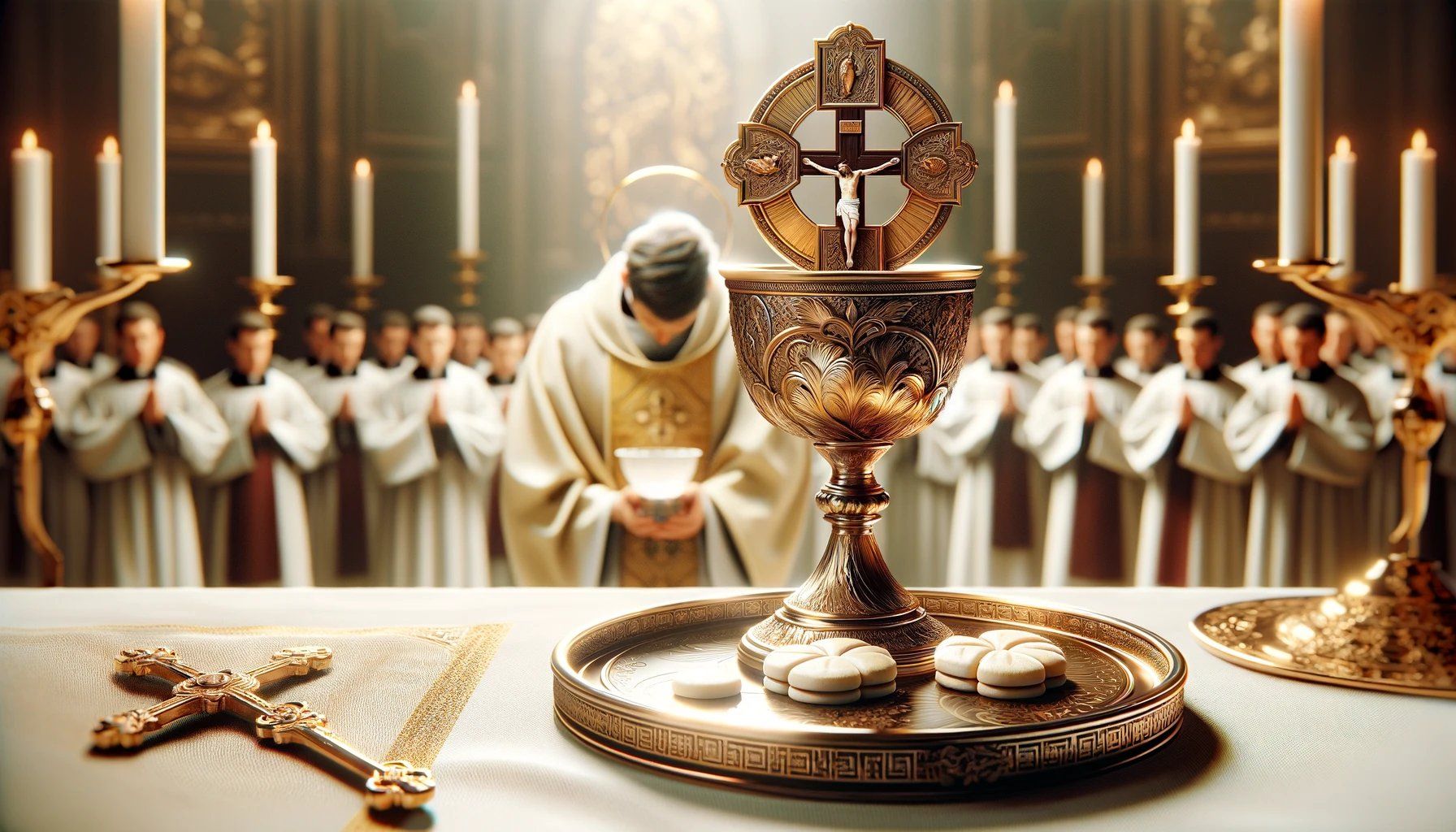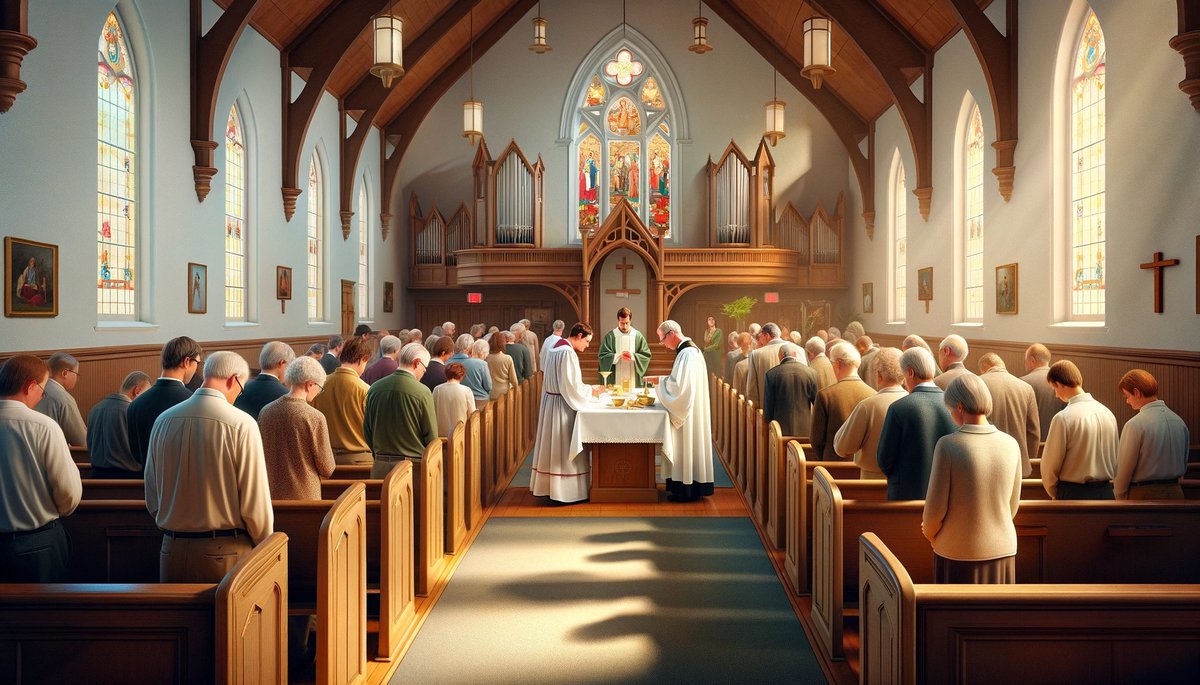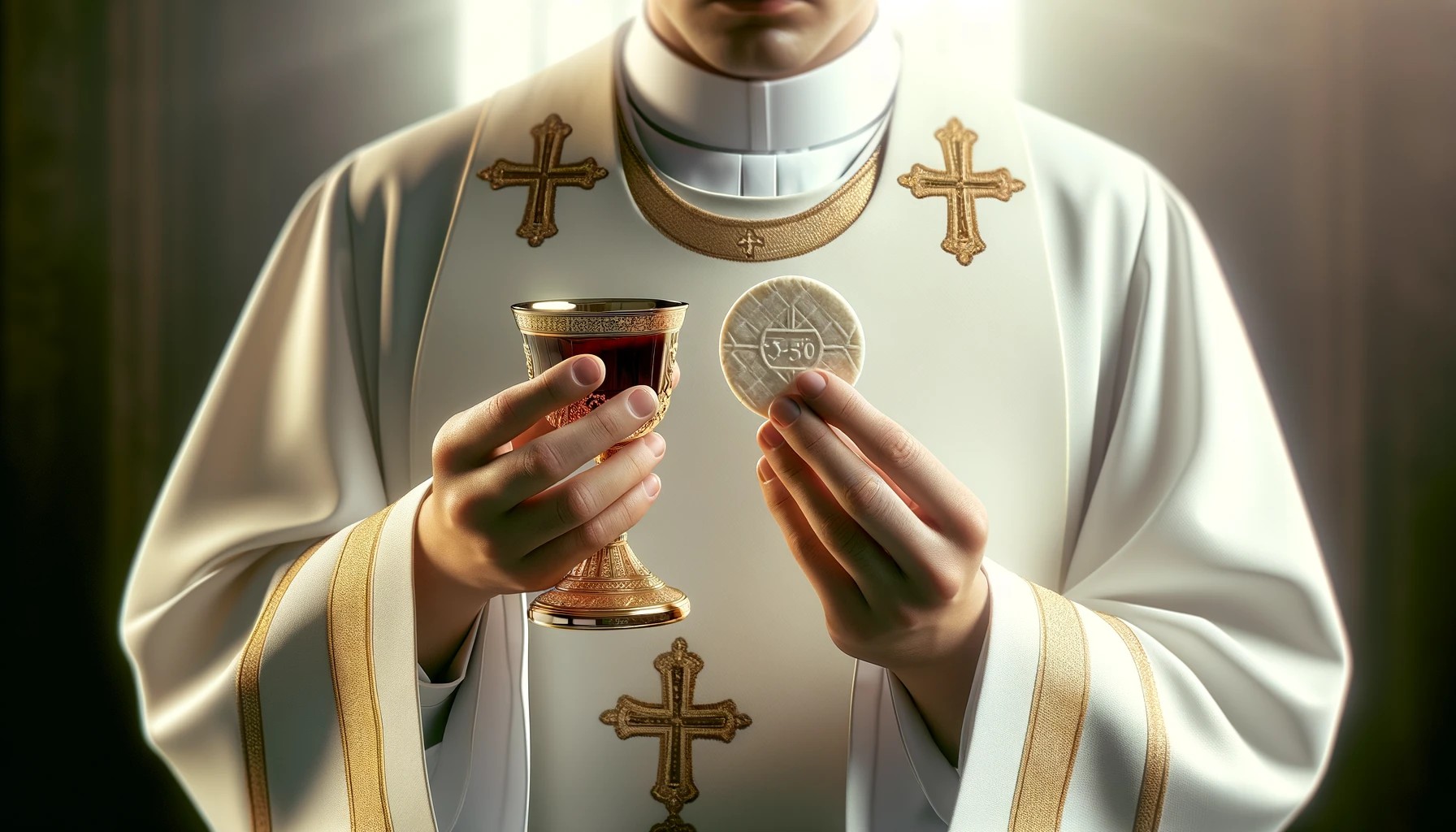Home>Theology and Spirituality>Who Takes Holy Communion


Theology and Spirituality
Who Takes Holy Communion
Published: February 19, 2024
Ericka Andersen, an editor at Christian.net, expertly merges digital strategy with content creation, focusing on faith and societal issues. Her communication skills enhance the platform's engaging narratives, fostering meaningful dialogue on belief's impact on society.
Discover the significance of Holy Communion and its role in theology and spirituality. Learn who takes part in this sacred ritual and its spiritual importance.
(Many of the links in this article redirect to a specific reviewed product. Your purchase of these products through affiliate links helps to generate commission for Christian.net, at no extra cost. Learn more)
Table of Contents
Introduction
Holy Communion, also known as the Eucharist or the Lord's Supper, holds profound significance in Christian faith and practice. It is a sacred ritual that symbolizes the central aspects of the Christian faith, including the sacrificial death and resurrection of Jesus Christ, the forgiveness of sins, and the unity of believers as the body of Christ.
The act of Holy Communion has been a cornerstone of Christian worship for centuries, tracing its origins to the Last Supper, where Jesus shared bread and wine with his disciples, instructing them to partake in remembrance of him. This pivotal event forms the basis of the sacrament of Holy Communion, which continues to be a deeply meaningful and spiritually enriching practice for Christians worldwide.
As we delve into the profound significance of Holy Communion, it is essential to explore its multifaceted meanings and the diverse practices associated with it across various Christian denominations. Additionally, we will address the eligibility criteria for partaking in Holy Communion and shed light on the inclusion of children in this sacred observance.
Join me on this enlightening journey as we unravel the rich tapestry of Holy Communion, delving into its spiritual depth and the diverse ways in which it is observed within the Christian faith.
Read more: How To Take The Holy Communion
The Meaning of Holy Communion
At the heart of Christian worship and spirituality lies the profound significance of Holy Communion. This sacred ritual, also referred to as the Eucharist or the Lord's Supper, embodies the central tenets of the Christian faith, serving as a poignant symbol of Christ's sacrificial death and resurrection. The act of Holy Communion is deeply rooted in the biblical narrative, tracing its origins to the Last Supper, a pivotal event where Jesus Christ shared bread and wine with his disciples, imparting to them the enduring command to partake in remembrance of him.
The elements of bread and wine, representing the body and blood of Christ, hold profound symbolism within the context of Holy Communion. As Christians partake in these elements, they are reminded of the selfless sacrifice of Jesus on the cross, his redemptive love, and the promise of eternal life. This act of partaking in the bread and wine signifies a spiritual communion with Christ, fostering a deep sense of unity and fellowship among believers.
Furthermore, Holy Communion serves as a powerful expression of the forgiveness of sins and the reconciliation between humanity and God. Through the act of partaking in the Eucharist, Christians reaffirm their faith in the atoning work of Christ, finding solace in the assurance of divine grace and mercy. The ritual of Holy Communion thus becomes a transformative and spiritually enriching experience, inviting believers to reflect on their relationship with God and their interconnectedness with the larger Christian community.
In essence, Holy Communion encapsulates the core principles of Christian faith, encapsulating themes of redemption, unity, and spiritual nourishment. It stands as a poignant reminder of Christ's enduring presence and his redemptive love, inviting believers to partake in a sacred communion that transcends the boundaries of time and space. As we delve deeper into the multifaceted meanings of Holy Communion, it becomes evident that this sacred ritual holds a central place in the spiritual journey of believers, offering a profound opportunity for reflection, renewal, and communion with the divine.
Who is Eligible to Take Holy Communion?
In the Christian tradition, the question of eligibility for Holy Communion is deeply intertwined with theological considerations and ecclesiastical practices. The criteria for participation in the Eucharist vary across different denominations, reflecting diverse interpretations of scripture and theological perspectives. However, certain overarching principles and considerations underpin the eligibility for partaking in Holy Communion within the Christian faith.
One fundamental aspect that shapes the eligibility for Holy Communion is the concept of baptism. In many Christian traditions, baptism is regarded as a prerequisite for participating in the Eucharist. Baptism symbolizes the initiation into the Christian faith and the incorporation into the body of Christ, signifying a spiritual rebirth and the forgiveness of sins. As such, individuals who have undergone baptism are often considered eligible to partake in Holy Communion, as they have publicly affirmed their commitment to the Christian faith and its sacramental life.
Furthermore, the question of eligibility for Holy Communion is intricately linked to the understanding of the Eucharist as a communal act of worship and spiritual nourishment. Within the context of Christian community, the Eucharist serves as a unifying force, bringing together believers from diverse backgrounds and experiences. As a result, the eligibility for Holy Communion is often extended to baptized members of the Christian community, fostering a sense of inclusivity and shared participation in the sacred ritual.
In addition to baptism and communal participation, the discernment of one's readiness to partake in Holy Communion is a significant consideration in determining eligibility. This discernment encompasses a range of factors, including an individual's understanding of the significance of the Eucharist, their spiritual preparedness, and their commitment to living out the teachings of Christ in their daily lives. Many Christian traditions emphasize the importance of personal reflection and examination as part of the eligibility process, encouraging believers to approach the Eucharist with reverence, humility, and a contrite heart.
It is important to note that the question of eligibility for Holy Communion is approached with sensitivity and pastoral care within Christian communities. While certain denominations may have specific guidelines regarding eligibility, the overarching emphasis is placed on fostering a spirit of inclusion, grace, and spiritual discernment. Ultimately, the eligibility for Holy Communion is rooted in the desire to nurture a deep and meaningful encounter with the presence of Christ in the Eucharist, inviting believers to partake in a sacred communion that transcends individual circumstances and backgrounds.
As we navigate the complex terrain of eligibility for Holy Communion, it becomes evident that this question is intricately woven into the fabric of Christian theology, ecclesiastical traditions, and the spiritual journey of believers. The diverse perspectives and practices surrounding eligibility reflect the rich tapestry of Christian faith and the enduring significance of the Eucharist as a source of spiritual nourishment, unity, and divine encounter.
Children and Holy Communion
The inclusion of children in the observance of Holy Communion is a topic that evokes thoughtful reflection and theological consideration within Christian communities. Across various denominations, differing perspectives and practices exist regarding the participation of children in the Eucharist, reflecting nuanced theological interpretations and pastoral approaches.
In many Christian traditions, the question of children and Holy Communion is intertwined with the understanding of baptism and the initiation into the sacramental life of the church. Baptism, often viewed as the entry point into the Christian faith, holds significant implications for the participation of children in the Eucharist. For some denominations, the act of baptism marks the eligibility of children to partake in Holy Communion, signifying their incorporation into the body of Christ and their inclusion in the sacramental life of the church.
Furthermore, the readiness of children to comprehend the profound significance of the Eucharist and its theological underpinnings is a central consideration in discussions surrounding their participation in Holy Communion. Many Christian communities emphasize the importance of nurturing a foundational understanding of the Eucharist within children, providing age-appropriate education and guidance to cultivate a meaningful appreciation for this sacred ritual. This educational process often involves imparting the central themes of Christ's sacrificial love, the symbolism of the bread and wine, and the communal nature of the Eucharist, equipping children with the spiritual awareness necessary for their participation in Holy Communion.
The pastoral care and discernment of children's readiness for Holy Communion also play a pivotal role in shaping the practices of Christian communities. Pastors, parents, and church leaders engage in thoughtful dialogue and discernment processes to assess the spiritual preparedness of children, considering their capacity for reverence, understanding, and active participation in the Eucharistic celebration. This discernment process reflects a commitment to nurturing the spiritual growth of children and fostering a sense of belonging within the Christian community.
It is important to recognize the diversity of perspectives and practices regarding children and Holy Communion across different Christian denominations. While some traditions embrace the early participation of children in the Eucharist, others may adopt a more gradual approach, emphasizing the significance of spiritual formation and education as prerequisites for partaking in Holy Communion. Regardless of the specific practices, the inclusion of children in the observance of Holy Communion underscores the value of nurturing their spiritual development and fostering a sense of belonging within the larger Christian community.
As we navigate the intricate terrain of children and Holy Communion, it becomes evident that this topic embodies the intersection of theology, pastoral care, and the spiritual formation of young believers. The diverse perspectives and practices surrounding children's participation in the Eucharist reflect the profound commitment of Christian communities to nurture the faith of the next generation and to cultivate a deep and meaningful encounter with the presence of Christ in the sacred ritual of Holy Communion.
Different Christian Denominations and Holy Communion Practices
The observance of Holy Communion varies significantly across different Christian denominations, reflecting diverse theological perspectives, historical traditions, and ecclesiastical practices. These variations encompass a wide spectrum of beliefs and rituals, each contributing to the rich tapestry of Christian faith and worship.
In the Roman Catholic Church, Holy Communion, known as the Eucharist, holds a central place in the liturgical life of the faith community. The Catholic understanding of the Eucharist centers on the doctrine of transubstantiation, wherein the bread and wine are believed to undergo a profound transformation, becoming the actual body and blood of Christ. This theological perspective underscores the sacred nature of the Eucharist and the belief in the real presence of Christ in the consecrated elements. The celebration of the Mass, with its intricate liturgical rites and reverence for the Eucharist, forms the cornerstone of Catholic Holy Communion practices.
In contrast, within the Protestant tradition, diverse interpretations of the Eucharist have given rise to varying practices across denominations. For example, in Lutheran theology, the concept of consubstantiation is upheld, suggesting that Christ is present alongside the bread and wine in a unique manner during the Eucharist. Lutheran Holy Communion services often emphasize the proclamation of the Word and the administration of the sacrament as integral components of worship, reflecting a deep reverence for the Eucharist as a means of grace and spiritual nourishment.
Similarly, in Anglican and Episcopal traditions, the celebration of the Eucharist holds a prominent role in liturgical worship. The Book of Common Prayer guides the administration of Holy Communion, emphasizing the communal nature of the Eucharist and the spiritual significance of partaking in the body and blood of Christ. The rich liturgical heritage of Anglicanism underscores the solemnity and reverence accorded to the Eucharistic celebration, reflecting a deep sense of continuity with ancient Christian practices.
Furthermore, in Reformed traditions, such as Presbyterianism and Congregationalism, the Eucharist is viewed as a symbolic remembrance of Christ's sacrifice, emphasizing the spiritual presence of Christ in the act of partaking. The observance of Holy Communion within these traditions often centers on the proclamation of the Word and the communal sharing of the bread and cup, symbolizing the unity of believers and their participation in the redemptive work of Christ.
Additionally, within the Orthodox Christian tradition, the celebration of the Divine Liturgy encompasses the solemn and mystical observance of the Eucharist, reflecting the rich theological and liturgical heritage of Eastern Orthodoxy. The emphasis on sacred tradition, iconography, and the mystical encounter with the divine underscores the profound significance of the Eucharist within Orthodox Holy Communion practices.
As we navigate the diverse landscape of Christian denominations and their Holy Communion practices, it becomes evident that each tradition contributes to the multifaceted tapestry of Christian worship and spirituality. The variations in theological perspectives, liturgical expressions, and sacramental theology underscore the depth and richness of the Eucharistic tradition within the Christian faith, inviting believers to engage in a profound encounter with the presence of Christ in the sacred ritual of Holy Communion.
Conclusion
In conclusion, the profound significance of Holy Communion within the Christian faith transcends theological doctrines and denominational practices, encapsulating the enduring themes of redemption, unity, and spiritual nourishment. The act of partaking in the Eucharist serves as a poignant symbol of Christ's sacrificial love and the promise of eternal life, inviting believers to engage in a sacred communion that fosters a deep sense of spiritual renewal and unity within the body of Christ.
The diverse interpretations and practices surrounding Holy Communion across Christian denominations reflect the rich tapestry of beliefs and traditions that have evolved over centuries. From the Roman Catholic emphasis on the real presence of Christ in the Eucharist to the symbolic remembrance of Christ's sacrifice in Reformed traditions, each expression of Holy Communion contributes to the vibrant mosaic of Christian worship and spirituality.
Furthermore, the question of eligibility for Holy Communion underscores the pastoral care and discernment that shape the participation of individuals, emphasizing the importance of baptism, communal participation, and spiritual readiness. The inclusion of children in the observance of Holy Communion also reflects the commitment of Christian communities to nurture the faith of the next generation and to cultivate a deep and meaningful encounter with the presence of Christ in the sacred ritual.
As we navigate the intricate terrain of Holy Communion, it becomes evident that this sacred observance holds a central place in the spiritual journey of believers, offering a profound opportunity for reflection, renewal, and communion with the divine. The Eucharist stands as a timeless testament to the enduring presence of Christ in the life of the Church, inviting believers to partake in a sacred communion that transcends individual circumstances and backgrounds.
Ultimately, the rich tapestry of Holy Communion reflects the unity of the body of Christ across diverse traditions, inviting believers to partake in a sacred ritual that embodies the timeless truths of the Christian faith. As we continue to engage in the observance of Holy Communion, may we find solace in the redemptive love of Christ, experience the transformative power of divine grace, and embrace the unity and fellowship that this sacred ritual embodies.














